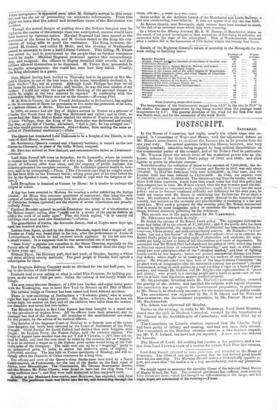POSTSCRIPT.
SATURDAY.
In the House of Commons, last night, nearly the whole time was oc- cupied, in Committee of Ways and Means, with the adjourned debate on Mr. Hume's amendment, to continue the Income-tax in its present form for one year only. The actual question before the House, however, was very slightly touched; attention being engaged by long critical disquisitions on the commercial policy of the country, and of Sir Robert Peel in particular.
Mr. WILSON threw the whole force of his statistical power into an ela- borate defence of Sir Robert Peel's policy of 1842 and 1845; aud cited figures to prove its absolute success.
Notwithstanding the redaction of taxes to the amount of 7,897,0001., the de- crease in the aggregate receipts of Customs and Excise in 1847 was only about 700,0001. In 1842 the Deficiency Bills were 6,600,0001.- in 1847 none, and the Funded Debt has been reduced by 14,000,0001. In 1842, our exports were 47,000,0001.; in 1846,57,000,0001. The distress arising from the famine, which we share with other countries, would have been much worse but that this licy had
been adopted just in time. Mr..Wilson argued, that the way to make g the defi- ciency of revenue as compared with expenditure, would be to carry out the same policy; and as he foresaw continued difficulty and deficiency for the next year, he could not concur with Mr. Hume in continuing the Income-tax for so short a time. He vindicated an income-tax as a proper element in the taxation of the country, but insisted on the necessity anti practicability of rendering it a fair and equal tax. With such a prospect for the ensuing year, Mr. Wilson maintained that it would be most desirous policy to entertain the Budget in its present -shape, without distinctly providing for the detioienoy.
This speech was in the main echoed by Mr. Caitowatz.
Mr. DISRAELI undertook to reply. -- - _ He denied the success of Sir Robert Peel's policy. 'The. aggregate natiotuthin- come had fallen off to the extent of 17,500,0001.; and if the public debt has been reduced by 20,000,0001., the realesn is, that 39,000,0001. hasbu raised from In- come-tax, China-money, and such extraordinary sources. Mr. Disraeli—" a Free- trader, but not a free-hooter" of the Manchester school—went on to criticize Sir Robert Peel's policy in his peculiar style of abstraction and analysis; his argu- ments not being so new as some of his illustrations and turns of expression. He contended that Sir Robert Peel had abandoned his policy of 1842, which was based on fruitless expectations of commercial "reciprocity," and had, in 1845, intro- duced two new principles—that of the "cheapest market," and that of fighting hostile tariffs by free imports: hence our present commercial distress and fin:m- eal deficit; which ought to be made good by the authors of such Mischievous policy. Mr. Disraeli called the blue book of the Import-duties. Committee "the greatest work of imagination that the nineteenth century has produced"; likened Government, acting on such guides, to 0. man smoking a cigar on a barrel of gun- powder; and warned Mr. Cobden and Mr. Bright—the representatives of "peace and plenty," who preach to a starving people spit a world in arias—not to ven- ture on.middle class legislation against realized property.
Mr. GLADSTONE, brushing aside Mr. Disraeli's personal sallies, restored the gravity of the debate, and handled the subjects with logical closeness. His conclusion was to support the Government proposition, in preference to Mr. flume's, as absolutely necessary for the maintenance of public credit.
The amendment was supported by Mr. J. B. Silt= and Sir Wituast MOLESWORTH ; the Government proposition, by Mr. Pamir Maass and Mr. BROTHERTON.
The debate was adjourned till Monday.
Earlier in the evening, in reply to Mr. Horuswasr, Lord Jolts( Russet', stated that the stall in Durham Cathedral, vacated by the translation of' Dr. Sumner to the Archbishopric of Canterbury, will not be filled up at present.
The Committee on Lincoln election reported. that Mr. Charles Seely had been guilty of bribery and treating, and had not been duly elected. The Committee on the Bewdley election came to a like decision respect- ing Mr. T. J. Ireland, but have not yet reported. A new writ was ordered for Lincoln.
The House of Lords did nothing but receive a few petitions, and a no- tice from Lord FITZWILLIAM of a motion for certain Irish Poor 'law returns.


























 Previous page
Previous page